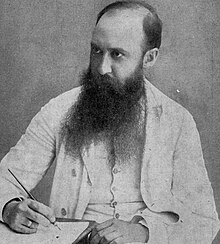Nicolae Iorga
| Nicolae Iorga | |
|---|---|

Nicolae Iorga in 1914 (photograph published in Luceafărul)
|
|
| Prime Minister of Romania | |
|
In office April 19, 1931 – June 6, 1932 |
|
| Monarch | Carol II |
| Preceded by | Gheorghe Mironescu |
| Succeeded by | Alexandru Vaida-Voievod |
| Personal details | |
| Born |
January 17, 1871 Botoșani |
| Died | November 27, 1940 (aged 69) Strejnic |
| Nationality | Romanian |
| Political party | Democratic Nationalist Party |
| Spouse(s) | Maria Tasu (div.) Ecaterina Bogdan |
| Religion | Romanian Orthodox |
| Signature | |
Nicolae Iorga (Romanian pronunciation: [nikoˈla.e ˈjorɡa]; sometimes Neculai Iorga, Nicolas Jorga, Nicolai Jorga or Nicola Jorga, born Nicu N. Iorga; January 17, 1871 – November 27, 1940) was a Romanian historian, politician, literary critic, memoirist, poet and playwright. Co-founder (in 1910) of the Democratic Nationalist Party (PND), he served as a member of Parliament, President of the Deputies' Assembly and Senate, cabinet minister and briefly (1931–32) as Prime Minister. A child prodigy, polymath and polyglot, Iorga produced an unusually large body of scholarly works, consecrating his international reputation as a medievalist, Byzantinist, Latinist, Slavist, art historian and philosopher of history. Holding teaching positions at the University of Bucharest, the University of Paris and several other academic institutions, Iorga was founder of the International Congress of Byzantine Studies and the Institute of South-East European Studies (ISSEE). His activity also included the transformation of Vălenii de Munte town into a cultural and academic center.
In parallel with his scientific contributions, Nicolae Iorga was a prominent right-of-center activist, whose political theory bridged conservatism, nationalism and agrarianism. From Marxist beginnings, he switched sides and became a maverick disciple of the Junimea movement. Iorga later became a leadership figure at Sămănătorul, the influential literary magazine with populist leanings, and militated within the Cultural League for the Unity of All Romanians, founding vocally conservative publications such as Neamul Românesc, Drum Drept, Cuget Clar and Floarea Darurilor. His support for the cause of ethnic Romanians in Austria-Hungary made him a prominent figure in the pro-Entente camp by the time of World War I, and ensured him a special political role during the interwar existence of Greater Romania. Initiator of large-scale campaigns to defend Romanian culture in front of perceived threats, Iorga sparked most controversy with his antisemitic rhetoric, and was for long an associate of the far right ideologue A. C. Cuza. He was an adversary of the dominant National Liberals, later involved with the opposition Romanian National Party.
...
Wikipedia
